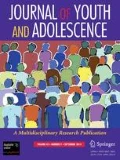Abstract
Relationships between socioeconomic status, locus of control, self-concept, and academic achievement were explored in secondary school pupils in the Mmabatho area of Bophuthalswana (Southern Africa). The analyses of data revealed the following: (a) both male and female Batswana adolescents were found significantly more externally oriented when compared against the normative data provided by Nowicki-Strickland (1973); (b) socioeconomic status was significantly positively associated with internality, self-concept, and academic achievement in English; (c) externality was significantly negatively related to self-concept and achievement in English; (d) self-concept was significantly positively correlated to measures of achievement in English and mathematics; and (e) mathematics achievement of male students was significantly higher than female ones.
Similar content being viewed by others
References
Bar-Tal, D., and Bar-Zohar, Y. (1977). The relationship between perception of locus of control and academic achievement: Review and some educational implications.Contemp. Educat. Psychol. 2: 181–199.
Bar-Tal, D., Kfir, D., Bar-Zohar, Y., and Chen, M. (1980). The relationship between locus of control and academic achievement, anxiety and level of aspirations.Br. J. Educat. Psychol. 50: 53–60.
Battle, E., and Rotter, J. B. (1963). Children's feelings of personal control as related to social class and ethnic groups.J. Personal. Soc. Psychol. 31: 482–490.
Bhatnager, J. (1969). A study of adjustment of immigrant children in a London school. Ph.D. dissertation, University of London.
Chebat, J. C. (1986). Social responsibility, locus of control and social class.J. Soc. Psychol 126: 559–561.
Child, D. (1981).Psychology and the Teacher (3rd ed.). Holt, Rinehart & Winston, London.
Chiu, L. H. (1987). Locus of control differences between American and Chinese adolescents.J. Soc. Psychol. 128: 411–413.
Coopersmith, S. (1967).The Antecedents of Self-Esteem. W. H. Freeman, San Francisco.
Cunningham, T., and Berberian, V. (1976). Sex differences in the relationship of self-concept to locus of control in children.Personal Soc. Psychol. Bull. 2: 277–281.
Gore, P. S., and Rolter, J. B. (1963). A personality correlate of social action.J. Personal. 31: 58–64.
Hansford, B. C., and Hattie, J. A. (1982). The relation between self and achievement/performance measures.Rev. Educ. Res. 52: 123–142.
Hart, J. G. (1985). LAWSEQ: Its relation to other measures of self-esteem and academic ability.Br. J. Educ. Psychol. 55: 167–169.
Hsieh, T. T., Shybut, J., and Lotsof, E. J. (1969). Internal versus external control and ethnic membership: A cross-cultural comparison.J. Consult. Clin. Psychol. 33: 122–124.
Mahler, I. (1974). A comparative study of locus of control.Psychologia 17: 135–139.
Maqsud, M. (1980). Relationships between personal control, moral reasoning and socioeconomic status of Nigerian Hausa adolescents.J. Youth Adolesc. 9: 281–288.
Maruyama, G., Rubin, R., and Kingsbury, G. G. (1981). Self-esteem and educational achievement: Independent constructs with a common cause.J. Personal Soc. Psychol. 40: 962–975.
McGinnies, E., Nordholm, L. A., Ward, C. D., and Bhanthumnavin, D. L. (1974). Sex and cultural differences in perceived locus of control among students in five countries.J. Consult. Clin. Psychol. 42: 451–455.
Nowicki, S., and Strickland, B. R. (1973). A locus of control scale for children.J. Consult. Clin. Psychol. 40: 148–154.
Obanya, P. (1976). Relationship between self-concept and performance in achievement tests of French.West Afr. J. Educat. Vocat. Measure. 3: 39–43.
Piers, E., and Harris, P. (1964). Age and other correlates of self-concept in children.J. Educat. Psychol. 55: 91–95.
Pottebaum, S. M., Keith, T. Z., and Ehly, S. W. (1986). Is there a causal relation between self-concept and academic achievement?J. Educat. Res. 79: 140–144.
Purkey, W. W. (1970).Self-Concept and School Achievement. Prentice-Hall, Englewood Cliffs, NJ.
Rosenburg, M. J. (1965).Society and the Adolescent Self-image. Princeton University Press, Princeton, NJ.
Rotter, J. B. (1966). Generalized expectancies for internal versus external control of reinforcement.Psychol. Monogr. 80(1).
Ryckman, R. M., Posen, C. F., and Kulberg, G. G. (1978). Locus of control among American and Rhodesian children.J. Soc. Psychol. 104: 165–173.
Sarson, J. G. (1972).Abnormal Psychology. Appleton-Century-Crofts, New York.
Sears, R. R., Maccoby, E. E., and Levin, H. (1957). Patterns of Child Rearing. Row Paterson, Evanston, IL.
Shaw, R. L., and Uhl, N. P. (1971). Control of reinforcement and academic achievement.J. Educat. Res. 64: 226–228.
Thomas, J. B. (1973).Self-concept in Psychology and Education: A Review of the Research. NFER, Slough.
Wallace, J. R., Cunningham, T. F., and Monte, V. D. (1984). Changes in the relationship between self-esteem and locus of control.J. Soc. Psychol. 124: 261–262.
Wylie, R. (1979).The Self-Concept: Theory and Research on Selected Topics (Vol. 2). University of Nebraska Press, Lincoln.
Author information
Authors and Affiliations
Rights and permissions
About this article
Cite this article
Maqsud, M., Rouhani, S. Relationships between socioeconomic status, locus of control, self-concept, and academic achievement of batswana adolescents. J Youth Adolescence 20, 107–114 (1991). https://doi.org/10.1007/BF01537354
Received:
Accepted:
Issue Date:
DOI: https://doi.org/10.1007/BF01537354




